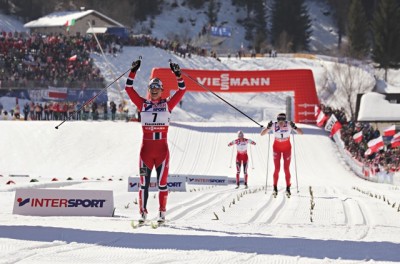NEWS ANALYSIS: Norway has long clung to a reputation of having top athletes free of doping scandals, but that’s now being severely challenged by controversy over skiers’ use of asthma medicine. Norwegian sports officials were facing another torrent of criticism on Friday from both inside and outside the country, while a government minister demanded a full, independent investigation.

“It’s time to admit that (Polish skiing star Justyna) Kowalczyk was right,” read the headline on a commentary in Norway’s biggest newspaper Aftenposten. It referred to Kowalczyk’s repeated concerns in recent years over Norwegian athletes’ use of asthma medicine, not least by her Norwegian arch rival Marit Bjørgen, who has won just about all there is to win in the sport of cross-country skiing.
“It’s strange that so many Norwegians have asthma, (in a country) where the air is so clean,” Kowalczyk commented earlier this summer when Norway’s Martin Johnsrud Sundby was stripped of gold medal victories from last season because of how he used his asthma medicine. There’s no question that Sundby, who intends to appeal the ruling, suffers from asthma, and he is widely viewed as being a victim of bad medical advice and instruction from a national skiing team doctor who has since resigned.
Now Norway’s TV2 has reported that Norwegian skiers who don’t suffer from asthma were also given asthma medicine, which is what Kowalczyk has claimed before. So have other skiers and sports officials in Poland, Russia, Finland and now Sweden, suggesting further that the asthma medicine, while legal, was administered to improve the Norwegians’ performance. They equated its use to doping.
‘Preventative health care’
The many chiefs within Norway’s sports bureaucracy have vigorously denied such doping charges, but appeared caught in a bind on Thursday. One of them, Vidar Løfshus of the national ski team, had problems trying to explain how and why allegedly unnecessary medication could have occurred. He first claimed that healthy Norwegian skiers were never offered medicine, but TV2 had spoken with several who were puzzled as to why they were indeed offered, even encouraged, to use asthma medicine before races.
Løfshus and other sports officials were then placed in highly uncomfortable positions. They have consistently denied any doping, claiming the asthma medicine has been necessary because the skiers compete in sub-freezing temperatures. The medicine doesn’t make them better, Løfshus claimed, but makes them able to participate.
Faced with questions over why otherwise healthy athletes should be offered medicine, if the goal was not to achieve extra effect, Løfshus tried another defense: “This is preventative health care. The lung system is the most important for cross-country skiers, and then we have to make sure their respiratory passages are in order.”
Norway’s own anti-doping agency quickly rejected Løfhus’ claim. Its sports doctors and lung specialists retorted, also on Norwegian Broadcasting (NRK) Thursday evening, that the questionable use of asthma medication was meaningless and unacceptable.
Denials no longer enough
“This is directly uncomfortable, what’s being revealed now,” wrote commentator Ola Bernhus in Aftenposten. He also noted how foreign rivals are now sneering at Norway, and that the credibility of Norway’s national skiing federation, Skiforbundet, has not been strengthened. On Friday, its president seemed to agree.
“It is not good for Norwegian cross-country skiing, not good for the entire sport of skiing in Norway and probably not good for Norwegian athletics in general if questions arise around our routines and practice,” Erik Røste, who carries the title of Norway’s “ski president,” told NRK. Both he and the leader of the foundation’s cross-country committee are now ordering a “thorough review” of the Norwegian national ski teams’ use of medication.
Røste still maintained that no healthy athletes are given medication, “but when claims are made about this, there’s a need for open and clear clarification.” He stressed that as the head of Norway’s overall skiing apparatus “it is my responsibility to obtain clarity in situations where the reputation of the federation is challenged.”
Government Minister Linda Hofstad Helleland, in charge of sports and cultural issues, didn’t seem entirely satisfied. She demanded on Friday that the investigation into use of asthma medication must be entirely independent of the sports bureaucracy. “There can’t be any questions about its findings and conclusions,” Helleland stated. Just before noon, the ski federation issued a new press release, stating that they had asked Antidoping Norge to help with the investigation and stressed it would be independent. “It is critical for us that this investigation is led by people who don’t have any ties to Norway’s ski federation,” stated the leader of the cross-country committee, Torbjørn Skogstad.
Bad week for Norwegian sports
The uproar comes just as Norwegian athletic officials are also under fire after the country’s worst showing in 52 years at the recent Summer Olympics. The Olympics have since been branded as a “fiasco” for Norway, amidst charges that sports bureaucrats weren’t delivering what has been promised and making efforts to muzzle critics.
It’s since been decided that the poor performance in Rio de Janeiro will be evaluated by an external commission in cooperation with feedback from the federations for the various sports. Critics nonetheless continued to point to power struggles among sports officials and calls went out for another reorganization of Norway’s sports bureaucracy, with more independence for its Olympic organization that nurtures top athletes.
newsinenglish.no/Nina Berglund

